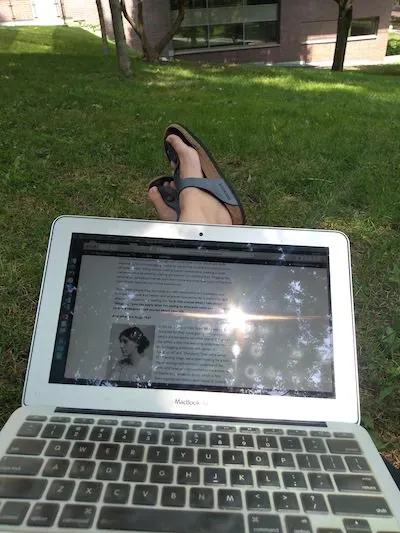The Opposite of Scrolling

True confession: I don’t have that experience that so many people describe of social media, how scrolling through your feed just makes you feel like your own experience is inadequate, because you don’t go on fancy vacations and have never had the means to hire a decorator, and have never once had your photo taken in a field of sunflowers.
And yes indeed, part of the reason I don’t feel those feelings of inadequacy is because I have a pretty nice life, with health and happiness—I am also RIDICULOUSLY good looking, but that’s another story—even if I’ve never had the means to hire a decorator and while we once did indeed visit a lavender field, all the plants had been stunted by a late season frost.
(I suspect it also helps that I tend to follow real humans whose photos were not all professionally shot on a mountain top during golden hour. #SponsoredPost #Partnership #SoBlessed)
But that’s only part of it. A huge reason why I tend to have a positive experience on social media is because, like many others, I don’t use these platforms passively, but instead I engage with them in an active way. I post photos, tell stories, reach out to friends, solicit feedback, share jokes, and heartaches, frustrations, insights and ideas. Each of my posts, no matter the platform, a kind of message in a bottle—except that it’s different from a bottle for the likelihood I’m going to get some kind of response.
And it’s that response I’m looking for, actually, every time I log in to Twitter, Facebook or Instagram—the first thing I do is check my notifications. (Not unrelated: turning OFF all notification alerts, so that I ACTIVELY have to seek them out, has improved my quality of life. So does not having Twitter or Facebook on my phone.)
So that what I get from social media (when I seek it out. Being deliberate is important) is actually community, genuine connections, friendship and support. And yes, I also want to see photos of your vacation, but it’s easier to not feel depressed when you’re in Hawaii and I’m in Toronto and it’s February when I don’t feel like I’m utterly alone in the world and also when I can scroll back and see a photo of the pretty mug of hot chocolate I posted yesterday. (Instagram is also about the beauty of small things and quiet moments. This matters to me a lot.)
I first started thinking about this the other week while I was listening to this radio interview with Mark Kingwell (“Canadian philosopher Mark Kingwell examines the idea of boredom and our digital devices”) about the dangers of passive scrolling. Kingwell says, “We’re not participants; we’re lab rats and the advertisers are gathering our data, and they’re feeding it back to us in forms like triangulation of desire. They are treating us as resources and they don’t care about you as an individual. They care about your data and about your preferences. So yes I do think that all kind of feeds back.”

But when you do participate, you complicate things with your humanness. (When you participate by blogging on your own website, you complicate things even more, and challenge the idea that the web is a corporate space wholly navigable by algorithm, and this is no small thing!) The opposite of passive is active, and the opposite of scrolling is creation. Yes, for some the answer might be to disconnect from social media and online life altogether, but for most of us something more nuanced is required. (Jenny Odell writes about this splendidly in How to Do Nothing: Resisting the Attention Economy.) The answer is first to be more conscious of how we use our attention online. The second answer to aspire to have a rich and engaged life off the internet. And the third is to be an active participant in online culture. Stop scrolling, and make stuff.
Because you’re Somebody. In fact, we all are.
And even better? I really believe that being an active participant in online culture can improve other parts of your experience IRL. (This is what I mean when, in my blogging course, I talk about how having a blog can make your life richer.) Yes, much of online experience is aspirational, but I think it’s weird that we wholly dismiss aspiration as a bad thing. How can it be, really, if these aspirations are ones it’s possible to realize?
There are so many books I’ve read, and places I’ve visited, cakes I’ve baked, and things I have seen that have been so incredible to experience—things I never would have known about if I hadn’t seen them on Instagram first.
I also remember in the months after my first child was born, when I was (though this was only evident to me in retrospect) deeply unhappy and the online images I was presented with of “perfect motherhood” didn’t actually make me feel less-than, but made me better, that a life beyond “lying on the floor half-naked and weeping” was actually possible. It was important for me to believe that it was, that one day I’d get dressed again.
So many times, the things I’ve seen online have kicked my ass (in the best way) and forced me to get out there in the world.
Because the world is interesting, but also because, otherwise I’d have nothing to blog about, to write about, to post about. And yes, there was that vastly overpriced soft-serve place near my house whose ice cream cones looked fabulous in my Insta-feed, but didn’t taste any better than an ice cream a quarter of the price that came off a truck—but that place actually went out of business. And it’s really not all as superficial as that.
What would happen if you went out of your way to find a flower to photograph tomorrow?
